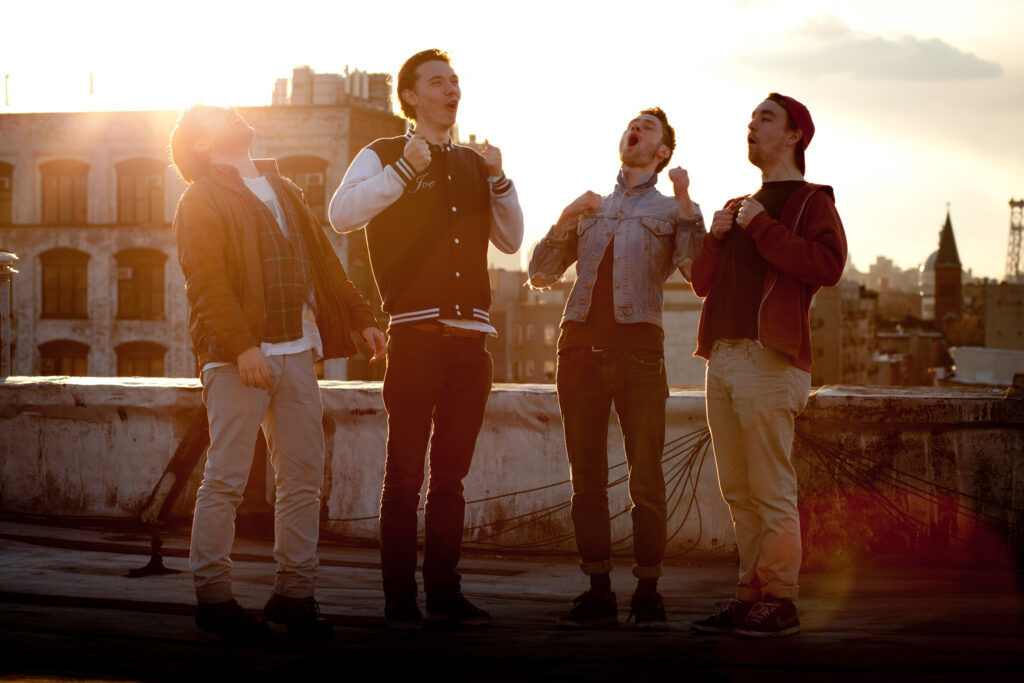LYF – SCRIPT TREATMENT. Roll opening credits. Scene one. Rio De Janiro, Brazil. The Kid (played by Hugh Grant) is meeting his father (played by Bruce Willis) during a noisy carnival street procession. He is there to kill him.
It’s easy to see why 20-year-old singer and organist from Wu Lyf, Ellery Roberts, abandoned his (pie in the sky) plans for producing a Hollywood blockbuster and decided to tell his story via the medium of the album Go Tell Fire To The Mountain instead. "We had the determination but not the cast and crew," he says simply – a self-imposed year long press silence ended now the record’s in the can. But it’s ok, the new long player he’s had a hand in creating instead still has all the sinister dread, life affirming elation and colossal reach of some cult film destined to be talked of in hushed tones for years to come. The softly spoken Mancunian is almost certainly taking the piss out of his interviewer when he claims to have envisaged Bruce Willis, Hugh Grant and PJ Harvey taking starring roles in his movie but joking aside, only a fool would doubt his burning ambition and his ultimate seriousness. Wu Lyf aka World Unite! Lucifer Youth Foundation aka Wu Lf Wu Lf aka Wu Def aka WE BROS aka Wolf Wolf aka Tu Wang Gang aka Vagina Wolf, is (mainly) the musical vision of Ellery and three other young men – Tommy McClung (bass), Evans Kati (guitar) and Joe Manning (drums) – none of whom are on the wrong side of 21 and all of whom live in the relentlessly unglamorous Ancoats district that rubs up against the Western edge of Manchester’s city centre.
Their moniker may conjure up visions of a Northern Wu Tang Clan (this is certainly the intent – they all rave about the relative merits of ODB and Gza as rappers during the interview) but their music comes more from a post punk/indie rock direction (imagine a young Tom Waits, or, yeah, the mad sounding one from Gomez if you want to be very uncharitable, fronting Clap Your Hands Say Yeah or These New Puritans). Their sound is steeped in cavernous reverb that calls to mind both early Health records and ‘Hip Priest’ by The Fall. Their album is exciting in some respects and monotonous in others but perhaps more than anything else, its the way they’ve managed to successfully sidestep nearly all the pitfalls that await young bands who are part of a hype feeding frenzy that impresses the most. Regardless of their debut, Wu Lyf, may be that rarest of things – a new indie rock band with a future. They certainly seem like the sort of band whose third album could be a stone cold classic.
(It should be said that much of this Luciferan Self Will is down to Warren Bramley, their manager, former Factory associate and advertising bod and his obviously great organizational skills. Since working this out some bloggers and journalists have become effervescent like teenagers who have just watched Oliver Stone’s JFK for the first time. Rather than carrying on with the rather embarrassing idea that they’ve somehow uncovered a story, they should perhaps try and construct a list of worthwhile bands who haven’t used internal or external nous to manipulate the press as part of their campaign at one point or other in the past. I’ll get you started: Terrorvision, The Bluetones, Uriah Heep, The Primitives… As we speak a broadsheet music hack is preparing a devastating expose on how the Sex Pistols didn’t achieve world fame single handedly and had some help from a shadowy figure known only as Malcolm… I mean, god forbid we actually have bands who are pro-active in the struggle to get the world to hear their music against the background of the wholesale collapse of the major record labels. As The Editor of Stool Pigeon Phil Hebblethwaite said, recently, ‘I don’t like that album but you’ve got to admire them. They’ve played Sydney Opera House! Why? Because of some You Tubes. I take my hat off to them…’ And when the giant ginger cracker’s hat comes off I always pay attention because usually some significant shit is about to transpire.)
What can you tell me about the church where the album was recorded. Where it is, what denomination it is and stuff like that?
Tommy McClung: We found the church on an off chance really. We really wanted to find a big space where we could record and get a good reverberant sound without having to mess around in a studio for hours trying to find the right effect. And we were on our way back from this crappy rehearsal space called Beehive when we saw people loading steel drums out of this church. So we went in and it had a pretty nondescript atmosphere but when you clapped your hand it had this really cool five second echo. [Band all immediately take the piss out of him shouting "cool!", "super!"] The church itself is in Ancoats and was built about 100-years ago for the Italian immigrant community.
When I lived in Manchester nearly 18-years ago Ancoats was pretty hanging, to use local terminology. How is it now?
Ellery Roberts: Pretty much the same. They were trying to regenerate it some time back and it’s got all these billboards that are now pretty ironic. They say: ‘Ancoats – The Future Is Bright!’ But all you can see is crumbling down factories… Yeah, so it’s pretty barren. It’s like an industrial wasteland.
If you were in charge of regeneration, what would you do with all those blocks of flats?
TM: We’d turn them all into swimming pools and have pool parties in them.
What can you tell me about the Lucifer Youth Foundation?
ER: It was founded in ’98.
Joe Manning: To help kids who can’t read good. They wanted to do other stuff but couldn’t. They needed something to believe in.
Evans Kati: We basically started it for us. It was kind of a way for us to facilitate us to do whatever we wanted. It’s a way for us to be creatively self-sufficient. Eventually it will be a way for us to put out whatever we want, not just music but other creative ventures as well.
ER: We decided to do it because we’d been approached by a bunch of different record labels and that whole game didn’t appeal to us. We realised quite quickly that we could provide everything for ourselves that a record label would give us other than money, which is why we signed up for a publication and distribution deal and nothing else. But the Lucifer Youth Foundation was arranged by us. The four band members and Warren Bramley. There is a board but no central ownership and people who become members [by buying the Heavy Pop 12"] in a larger collective sense and have joint ownership of the LYF.
I’m really interested in the figure of Satan in popular music. Why Lucifer? Are you interested in him as a symbol of free will?
ER: We’re not interested in Lucifer in the devil/hocus pocus side of things it’s more Lucifer as an alternative. He’s a metaphor for light in darkness.
TM: Lucifer, son of the morning.
With this, the church, the religious connotations of the title Go Tell Fire To The Mountain via spiritual music and the novel by James Baldwin and your use of cult imagery I’m being tempted to leap to some kind of conclusion here but I’ll hazard a guess that none of you are religious.
ER: That’s right. I was born Catholic but I’m not practising.
EK: I’m religious… in spirit. [Rest of the band laugh]
TM: I’ve always been fascinated by religion but I’m wary of all the rules. I just think religion has no faith in human beings. And I’m much more interested in human beings who do good for themselves rather than out of fear of God.
I don’t really follow football so can you explain how FC Barcelona was a business model, for want of a better term, for Wu Lyf?
ER: It was just a way of explaining what we wanted to do with the LYF with reference to an already existing model. So with FC Barcelona, the fans actually own the club but it’s there to entertain them, it’s not a political faction.
TM: The LYF for us is an opportunity to make things for a more committed fan base that wasn’t a passive bunch of faceless people who just check out blogs. It was to give it a more human element.
JM: Basically it’s like an old school fan club at the moment but the future’s unwritten as to what it could be.
After this interview is over I’m going to hang up and buy a 12" and, by testing the water, I’m going to try and see how much influence over the band I can exert. And I’m guessing that this is not going to be that much at all really…
ER: Not at this point no.
What if I have a nervous breakdown, move to Manchester [after all it’s happened once before, Ed] and start hanging round outside your rehearsal space, tearfully demanding to have a say in how the band is run?
JM: No one else has done it yet, so maybe you should.
ER: We’re just in the process of establishing ourselves so at this moment in time, we’ve just been getting ready to release the album. Maybe after it drops… maybe then…
What can you tell me about Play Heavy Pop – your club night – and why it didn’t last?
ER: We started it because there were things going on but nothing we really wanted to be part of. We wanted to play in a place where we felt more comfortable so Warren suggested Cafe Outlet. The first three were really good, it was basically our friends and other people who hadn’t heard our music yet but then the hype bubble began to grow and people started coming from London. It all got a bit… arms folded.
EK: People had heard about it on some trendy blog rather than coming down because they believed in it or thought it was good. It was about creating the right environment for us to do things in and this was all part of the reason why we went to ground and didn’t do any interviews for ages, because we were trying to create this record in a relatively unadulterated way away from the cynicism of hype.
Go Tell Fire To The Mountain is out now



